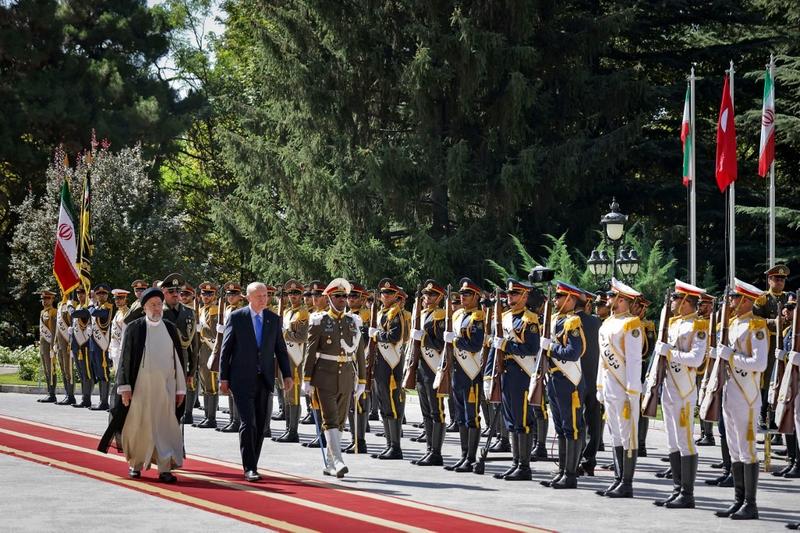 This handout picture provided by the Iranian presidential office shows Iran's President Ebrahim Raisi (left) welcoming Türkiye's President Recep Tayyip Erdogan (right) in Tehran on July 19, 2022. (IRANIAN PRESIDENCY / AFP)
This handout picture provided by the Iranian presidential office shows Iran's President Ebrahim Raisi (left) welcoming Türkiye's President Recep Tayyip Erdogan (right) in Tehran on July 19, 2022. (IRANIAN PRESIDENCY / AFP)
A trilateral summit among Iran, Russia and Türkiye in Teheran is tackling a range of regional security concerns aimed at finding a political resolution to the Syrian crisis, as well as grain security, among others.
Presidents Ebrahim Raisi of Iran, Vladimir Putin of Russia, Recep Tayyip Erdogan of Türkiye are meeting in the Iranian capital for the 7th Summit of the Astana peace talks on Syria – the three leaders are guarantor countries of the Astana Process, which was initiated in 2017 for peace in Syria. Syrian Foreign Minister Faisal Mekdad is also expected to join the meeting.
Presidents Ebrahim Raisi of Iran, Vladimir Putin of Russia, Recep Tayyip Erdogan of Türkiye are meeting in the Iranian capital for the 7th Summit of the Astana peace talks on Syria
All three countries are working together to try to minimize the violence in Syria. Russia and Iran support the Syrian government, while Türkiye has backed the opposition.
Syria has been divided into enclaves after protests against President Bashar al-Assad’s administration erupted in 2011, killing hundreds of thousands and displacing millions, according to the Syrian Observatory for Human Rights.
Iranian Foreign Minister Hossein Amir-Abdollahian tweeted on July 19 that the trilateral meeting in Teheran will also provide opportunity to further boost relations and develop economic cooperation, focus on security of the region through a political solution and “not resort to war” and to ensure food security. Iran, he added, “is center of dynamic diplomacy”.
ALSO READ: Kremlin: Putin, Erdogan to discuss Ukrainian grain exports Tuesday
Amir-Abdollahian had earlier said that, during his recent trip to Ankara and Damascus, he brought the message of Iranian president Raisi that the security crisis between Türkiye and Syria “can be managed”.
He was referring to Türkiye's plans to launch military operations in a 30-kilometer-deep security zone on the Syrian side of the Turkish border and said that they “tried to settle this crisis and allay Türkiye's security concern through the political path”, according to Tasnim News Agency.
Another concern on the agenda is preventing war and the further displacement of more Syrians and their country’s humanitarian situation.
On July 12, the United Nations Security Council extended for six months the authorization for UN to use the crossing point of Bab al-Hawa from Türkiye to Syria for humanitarian deliveries – an important outcome for 4.1 million Syrians, including 2.8 million internally displaced in northwest Syria who depend on vital aid to survive.
ALSO READ: Putin, Raisi, Erdogan to meet in Tehran next week
“The Iran-Türkiye-Russia Trilateral Summit on Syria in Teheran is very important given that the three countries have the biggest geopolitical and security interests in the future direction of Syria,” said Henelito Sevilla Jr, dean and professor in the Asian Center at the University of the Philippines.
Khaled Almasri, a former dean of the Faculty of International Relations and Diplomacy at Al-Sham Private University in Damascus, noted that Russia has worked with Iran many times on the ground in Syria “as the result of pragmatism of the Russian leaders”.
“All of these steps were before the Ukrainian crisis became more urgent,” Almasri said.
Both Iran and Russia have found common challenges as targets of Western sanctions over the 2015 Iran nuclear deal, known as the Joint Comprehensive Plan of Action or JCPOA, which the United States unilaterally abandoned in 2018 and owing to Russia’s “special military operation” in Ukraine.
READ MORE: UNSC re-authorizes cross-border aid deliveries into Syria
The two countries’ leaders have been advancing relationships with allies and broadening economic cooperation with their regional neighbors.
The trilateral summit takes place just days after US President Joe Biden’s first official Middle East tour since assuming office in January last year. Biden had separately met with the leaders of Saudi Arabia and Israel to counter Iranian influence in the region.
But Saudi Arabia's Foreign Minister Prince Faisal bin Farhan shut down rumors of an "Arab NATO", adding that talks between Saudi Arabia and Iran "have been positive". He also said that Saudi Arabia's hand is extended to Iran to achieve normal relations".
Xinhua contributed to this report.


